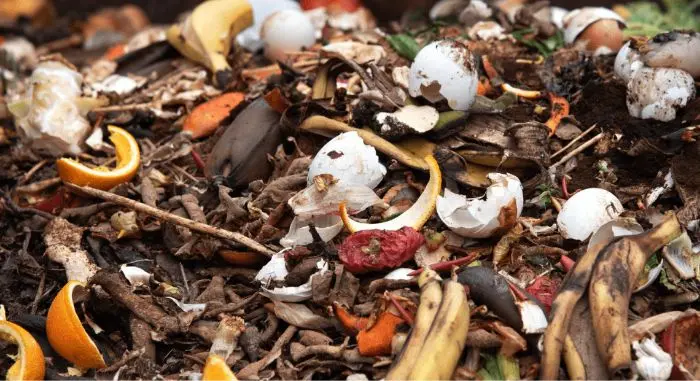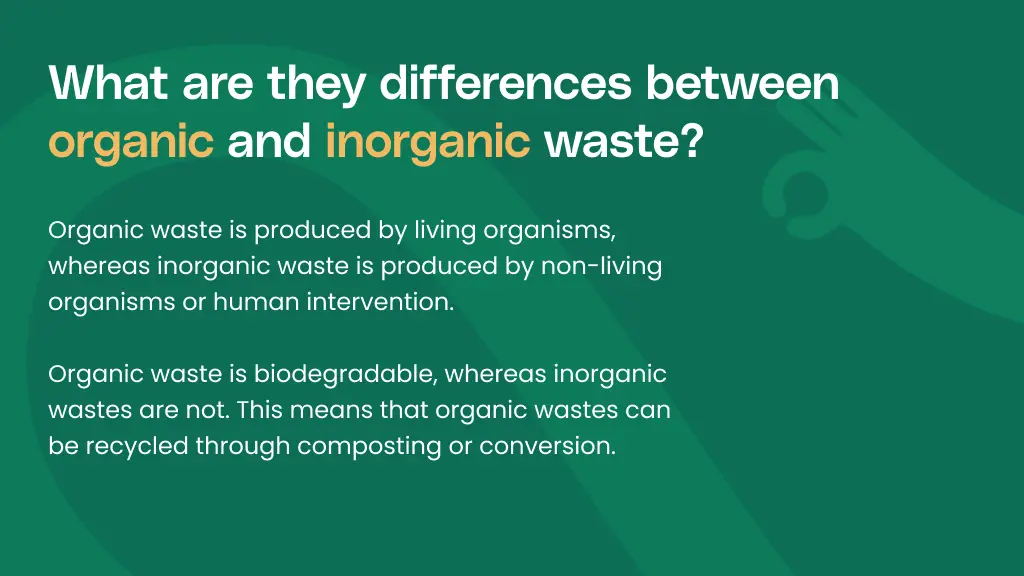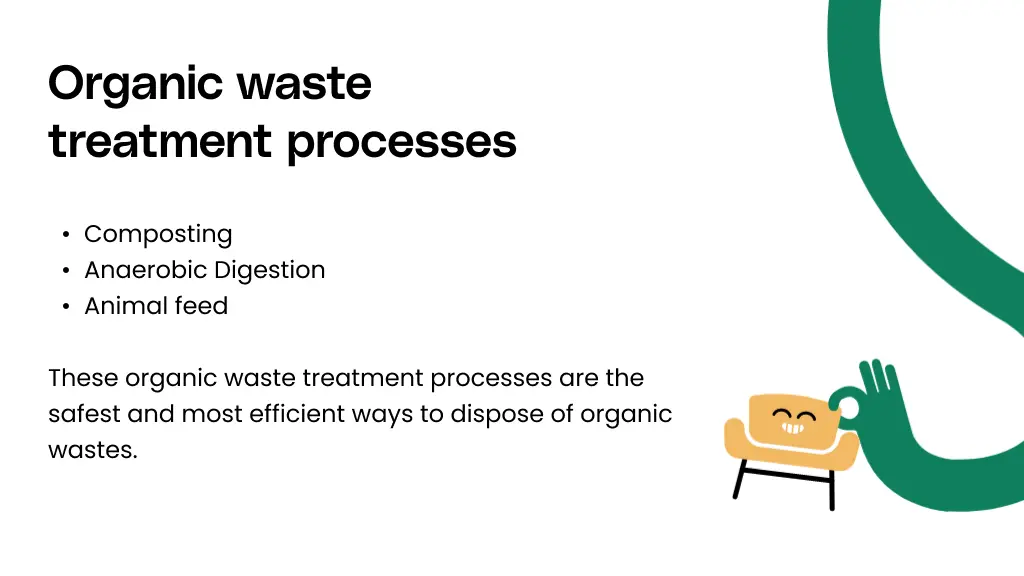
Have you been wondering how to separate organic and inorganic waste? Maybe you’re curious about organic waste treatment processes and whether they’re environmentally sustainable. You’re not alone.
Knowing how to dispose of organic and inorganic waste is of increasing importance in modern times given the sheer volume of waste disposal that will otherwise harm the environment. The recent upsurge of landfills across most localities further emphasises the increased necessity of adopting eco-friendly ways of disposing organic waste as our environment will suffer without it.
At Ridly, we’re regularly asked how to separate organic waste properly from inorganic materials. With the increase in human activities across the planet, there’s bound to be excessive amounts of organic and inorganic waste produced. In this article, we’ll run you through the differences between organic and inorganic waste and how to separate the two types of waste effectively in order to do your bit for the environment.
What Are the Differences Between Inorganic and Organic Waste?
If you’re not aware, there are a wide variety of differences that exist between organic and inorganic waste. As these waste types differ, it is crucial to understand how to separate organic and inorganic wastes for proper disposal.
1. Organic waste is waste produced by living organisms, whereas inorganic waste is produced by non-living organisms or human intervention.
2. Organic wastes are biodegradable, where inorganic wastes are not.
3. Organic waste comprises living or once-living organisms, whereas inorganic waste mainly consists of non-living matter and possesses mineral-like characteristics.
4. Organic waste is composed of carbon, whereas inorganic waste does not contain any traces of carbon.
5. Organic waste is naturally affected by heat and burns, whilst inorganic waste does not burn.
6. Organic waste has slower rates of reaction compared to inorganic waste due to the more complex products formed after a reaction between organic matter.

Inorganic vs Organic Materials
It is clear that the properties and characteristics of organic waste quite strongly differ from those of inorganic waste. As they require differing processing methods, it is important to know the difference for organic and inorganic wastes.
So, what are some examples of inorganic vs organic materials?
Examples of Organic Waste:
- Food scraps
- Coffee grounds, apple cores, eggshells and other kinds of food by-products
- Green waste such as yard trimmings, fallen leaves and pulled weeds
- Plants and cut flowers
- Livestock manure
- Cardboard packaging
- Paper
Examples of Inorganic Waste:
- Aluminium cans
- Plastic
- Glass
- Soda bottles
- Cellophane
- Electronic parts
This list will be helpful for you when considering how to separate and successfully dispose of organic and inorganic waste. Next time you need to get rid of waste, make sure you separate your organic waste from your inorganic waste according to this list so that all wastages are sustainably and ethically disposed of.
Why Is It Important to Know How to Dispose of Organic and Inorganic Waste?
As of today, Australia still heavily depends on landfills for waste disposal - most waste that is not re-used or recycled goes into landfills. However, organic waste in landfills produces methane, a substance that heavily contributes to global warming. Moreover, inorganic waste sent to landfills may as well be referred to as a ‘ticking time bomb’ due to the large quantities of toxic heavy metals such as lead, and mercury released into our water systems and soil as a result of degradation.
Landfill sites wreak havoc on natural wildlife and their habitats, contaminate soil quality and water supply and impact neighbouring communities and their residents’ health.
When considering how to separate the two different types of waste, note that keeping organic and inorganic waste out of landfills is a matter of protecting public health. As such, it is essential to know how to effectively dispose of organic and inorganic waste properly.
How to Dispose of Organic Waste
Commonly, people dispose of organic waste through landfills or incinerators, both of which produce toxic, harmful chemicals that damage our environment.
Thankfully, organic wastes are biodegradable, meaning they’re more easily disposed of. When considering “how do you separate organic waste from other types of waste?”, note that the unique characteristic of organic waste is its’ biodegradable properties. Composting and conversion are the safest ways to effectively dispose of organic waste. Composting breaks waste down until it becomes nutrient-rich fertiliser, whilst conversion turns food waste into a source of renewable energy. Make sure you put your food scraps and grass clippings in a compost bin!
Let’s take a closer look at some methods of organic waste processing and recycling.
Organic Waste Treatment Processes

1. Composting
Composting is the process of decomposition of organic waste. The organic materials are acted on by soil organisms, resulting in the recycling of nitrogen, phosphorus, potassium and other soil nutrients into humus-rich components. Composting is an aerobic process that takes place under correct conditions of moisture and biological heat production. It should be noted that some organic materials like woodchips and paper take much longer to compost compared to food and agricultural wastes. Compost bins are most suitable for use in houses to compost simple kitchen waste and garden cuttings.
This organic waste processing method saves landfill space and prevents contamination of land, improving soil conditions.
2. Anaerobic Digestion
Anaerobic digestion is a sequence of processes by which microorganisms break down biodegradable material in the absence of oxygen. Anaerobic digestion is a cost-effective technology for treating high moisture and energy-rich material, converting it into renewable energy. However, the biogas produced by anaerobic digestion includes gases such as methane and carbon dioxide, meaning it is not as sustainable as other methods.
3. Animal Feed
One of the more common, efficient and simple ways of recycling organic waste is to give agricultural and food waste to cattle and other animals as food. People can contact farmers and donate their wastes en masse to the animals.
The recycling of food through animal feed has many benefits, such as reducing pressure on landfills, reducing methane productions and saving time on converting these organic wastes into other forms. This also helps farmers as they do not have to buy extra animal feed.
4. Professional Organic Waste Disposal Service
These organic waste treatment processes can be time-consuming and costly for an individual to engage in alone. Luckily for you, Ridly are Sydney’s leading experts in waste disposal, offering the most efficient, affordable and environmentally sustainable solution for all organic and inorganic waste disposal. Where other rubbish removal companies will take your organic waste straight to landfill, we are conscious of harmful methane production and will dispose of your organic waste appropriately. Ridly has the equipment, skill and knowledge to safely remove and dispose of all your organic waste, offering the most trusted waste disposal Sydney has to offer.
Starting at just $69 for garden waste disposal, green waste disposal and more, our expert team of friendly rubbish removalists will arrive at your house in no time, making your life easy. Looking for same-day removal? Look no further. Call Ridly on 0491 181 130 and request a quote.
How to Dispose of Inorganic Waste
Like organic waste, forms of inorganic waste are often dumped in landfills around Sydney, damaging the environment. In contrast to organic waste, many forms of inorganic waste can actually be reused or recycled and made into other products thanks to technological advancement. As such, it would be a remarkable waste of potential resources to dump inorganic waste in landfills. Unfortunately, as of 2018, only 9% of the 6.3 billion tonnes of plastic that Australia produces in a year gets recycled, according to ABCs War on Waste.
To properly dispose of inorganic waste, one should recycle their inorganic waste. Knowing how to separate organic and inorganic waste may actually make you some cash! You can earn money from recycling centres depending on how much material can be recovered instead of paying fees for dumping.
Proper management of inorganic waste is the first step toward a sustainable and waste-free environment. We understand that recycling inorganic waste and all sorts of waste can be a time-consuming challenge. That’s whyRidly is here to help you get rid of garbage and junk, recycling them in a sustainable way that’ll protect our environment. Our same day rubbish removal services in Sydney are designed to keep costs affordable and the environment happy. No job is too big or too small – we remove rubbish of all shapes and sizes from residential and commercial properties across the Sydney region, starting from just $69. Call us on 0491 181 130 and request a quote today!
Recycling inorganic waste such as electric parts is undeniably beneficial for the environment. Valuable materials like metal and plastic can be recovered and reused through recycling for future products, reducing emissions that would otherwise be present in the production of new materials, subsequently preventing valuable materials from contributing to landfills.
Professional Organic and Inorganic Waste Removal Service
We all have types of organic and inorganic waste that need to be disposed of at one point or another. If you require assistance with the disposal of organic and inorganic wastes, Ridly provide same day rubbish removal services all across Sydney, taking away time and stress from the rubbish removal process.
If you would like more information, call the experts in waste disposal on 0491 181 130 or send an enquiry to us through our online quote form.